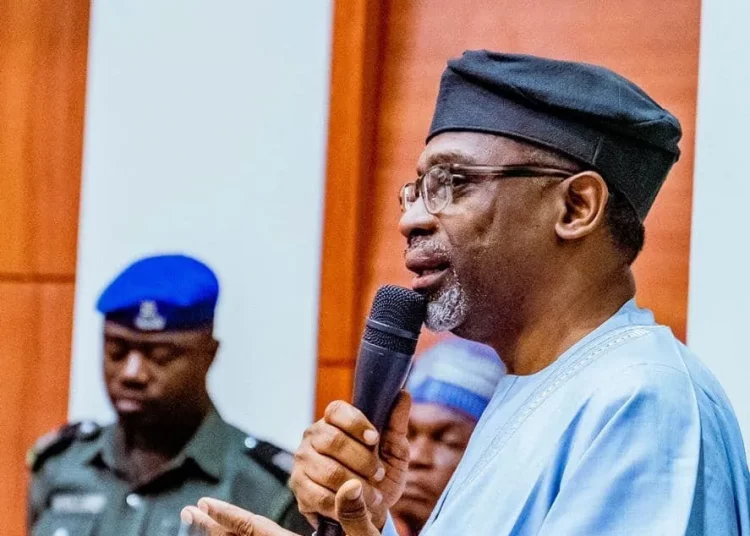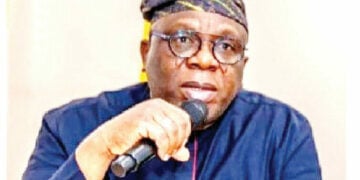The House last week held a public hearing on the bill seeking to establish the Electoral Offences Commission. Besides the establishment of the commission, the proposed legislation tagged: “A Bill to Establish the National Electoral Offences Commission” also proposed the lawmakers at least a 15-year jail term for anyone convicted of vote buying in any election and 20 years or a fine of N40 million for persons convicted of ballot box snatching.
It also proposed a minimum of 15 years for anyone convicted of destroying or defacing a voter’s card, sells or offers to sell or purchase while anyone convicted of hate speech or action which incites violence shall be liable to a minimum of 10 years imprisonment or at least N40 million.
Furthermore, the House is proposing at least six months jail term or a minimum of N100,000 for anyone convicted of disturbing public peace at the venue of an election while security personnel and staff of INEC convicted of trying to influence an election in favour of a candidate in an election shall be liable to at least six-month imprisonment or a minimum of N500,000.
The proposals include at least a 15-year jail term without option of a fine for any judicial officer convicted of perverting electoral justice and at least 10 year-jail term or a fine of N5 million or both for anyone convicted of impersonating a candidate in an election amongst others.
But the crux of the discussion at the public hearing was the argument put up by the Economic and Financial Crimes Commission (EFCC) which opposes the creation of a new agency to be solely responsible for electoral offences.
The EFCC in its presentation suggested that rather than establish a new commission to tackle electoral offences, existing agencies should be empowered to undertake the task.
According to the EFCC, it is apposite to state that these offences are offences that the Nigerian police, the Federal Ministry of Justice, the Economic and Financial Crimes (EFCC), the Independent Corrupt Practices and other related offences Commission (ICPC) and even the Independent National Electoral Commission (in Section 145 of the Electoral Act, 2022) are empowered under our extant laws to investigate and prosecute.
“There is, therefore, no need to create an agency solely to investigate and prosecute electoral offences most especially when our electoral process is seasonal in nature being that elections are held once in 4 years in the country.”
But for INEC, establishing an electoral offences commission will not be enough, there is also a need to create a special tribunal to try cases emanating from the proposed commission.
To this end, INEC disagreed with Clause 33 (1) of the bill which confers jurisdiction for the prosecution of electoral offenders on federal, state and Federal Capital Territory (FCT) high courts. Yakubu, while stating that the courts were already overburdened, canvassed for the establishment of an Electoral Offenders Tribunal with exclusive jurisdiction to try electoral offences.
The commission faulted clause 44 of the bill, which empowers the Attorney General of the Federation and Minister of Justice to make rules for the proposed commission.
INEC in its presentation noted that the body would want to see not just the prosecution of electoral offenders, but also their sponsors, who are usually beneficiaries of electoral crimes.
“At present, INEC is saddled with the responsibility of prosecuting electoral offenders under the Electoral Act. This has been very challenging. For instance, since the 2015 General Election, 125 cases of electoral offences were filed in various courts out of which 60 convictions have been secured so far, including the most recent one in Akwa Ibom State. The Commission would like to see more successful prosecution of offenders, not just ballot box snatchers, falsifiers of election results and vote buyers at polling units but most importantly their sponsors.
“We look forward to the day when highly placed sponsors of thuggery, including high-profile figures that seek to benefit from these violations, are arrested and prosecuted. We believe the work of the proposed Commission will help in this regard.”
INEC argued that in as much as it is desirous of seeing more successful prosecution of electoral offenders, the commission’s efforts is hampered by its other functions, hence the need for a National Electoral Offences Commission.
“The Commission’s incapacity to arrest offenders or conduct investigation that leads to successful prosecution of, especially the high-profile offenders, led to the suggestion to unbundle the Commission and assign some of its extensive responsibilities to other agencies as recommended by the Uwais and Nnamani Committees. For those who argue that the solution does not lie in expanding the federal bureaucracy by creating a new commission, we believe that the National Electoral Offences Commission should be seen as an exception. While there are other security agencies that deal with economic and financial crimes, I am yet to hear anyone who, in good conscience, thinks that it is unnecessary to have established the anti-corruption agencies.”
While the position of the EFCC about creating another agency is also valid, as it will further increase the size of government, the clamour by INEC should not be ignored. The lawmakers can, at least, amend the establishment law of the ICPC to accommodate specific electoral offences while the judiciary will set up a tribunal for the same purpose.





